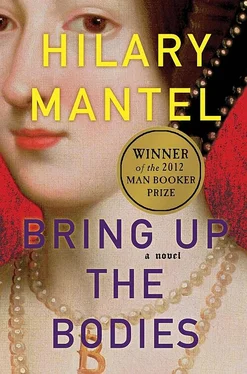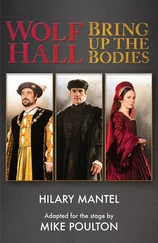He has conferred with the Seymour brothers on the motto Jane should adopt as queen. They settle on, ‘Bound to Obey and Serve’.
They try it out on Henry. A smile, a nod: perfect contentment. The king’s blue eyes are serene. Through the autumn of this year, 1536, in glass windows, in carvings of stone or wood, the badge of the phoenix will replace the white falcon with its imperial crown; for the heraldic lions of the dead woman, the panthers of Jane Seymour are substituted, and it is done economically, as the beasts only need new heads and tails.
The marriage is swift and private, in the queen’s closet at Whitehall. Jane is found to be the king’s distant cousin, but all dispensations are granted in proper form.
He, Cromwell, is with the king before the ceremony. Henry is quiet, and more melancholy that day than any bridegroom ought to be. He is not thinking about his last queen; she is ten days dead and he never speaks of her. But he says, ‘Crumb, I don’t know if I will have any children now. Plato says that a man’s best offspring are born when he is between thirty years and thirty-nine. I am past that. I have wasted my best years. I don’t know where they have gone.’
The king feels he has been cheated of his fate. ‘When my brother Arthur died, my father’s astrologer predicted that I should enjoy a prosperous reign and father many sons.’
You’re prosperous at least, he thinks: and if you stick with me, richer than you can ever have imagined. Somewhere, Thomas Cromwell was in your chart.
The debts of the dead woman now fall to be paid. She owes some thousand pounds, which her confiscated estate is able to meet: to her furrier and her hosier, her silkwomen, her apothecary, her linen draper, her saddler, her dyer, her farrier and her pinmaker. The status of her daughter is uncertain, but for now the child is well provided with gold fringing for her bed, and with caps of white and purple satin with gilt trim. The queen’s embroiderer is owed fifty-five pounds, and one can see where the money went.
The fee to the French executioner is over twenty-three pounds, but it is an expense unlikely to be repeated.
* * *
At Austin Friars, he takes the keys and lets himself into the little room where they store Christmas: where Mark was held, and where he cried out in fear in the night. The peacock wings will have to be destroyed. Rafe’s little girl will probably not ask for them again; children do not remember from one Christmas to the next.
When the wings are shaken out of their linen bag he stretches the fabric, holds it up to the light and sees that the bag is slit. He understands how the feathers crept out and stroked the dead man’s face. He sees that the wings are shabby, as if nibbled, and the glowing eyes dulled. They are tawdry things after all, not worth setting store by.
He thinks about his daughter Grace. He thinks, was my wife ever false to me? When I was away on the cardinal’s business as I so often was, did she take up with some silk merchant she knew through her business, or did she, as many women do, sleep with a priest? He can hardly believe it of her. Yet she was a plain woman, and Grace was so beautiful, her features so fine. They blur in his mind these days; this is what death does to you, it takes and takes, so that all that is left of your memories is a faint tracing of spilled ash.
He says to Johane, his wife’s sister, ‘Do you think Lizzie ever had to do with another man? I mean, while we were married?’
Johane is shocked. ‘Whatever put that into your head? Put it right out again.’
He tries to do that. But he cannot escape the feeling that Grace has slipped further from him. She was dead before she could be painted or drawn. She lived and left no trace. Her clothes and her cloth ball and her wooden baby in a smock are long ago passed to other children. But his elder daughter, Anne, he has her copy book. Sometimes he takes it out and looks at it, her name inked in her bold hand, Anne Cromwell, Anne Cromwell her book; the fish and birds she drew in the margin, mermaids and griffins. He keeps it in a wooden box faced and lined with red leather. On the lid the colour has faded to a pale rose. Only when you open it up do you see the original, shocking scarlet.
These light nights find him at his desk. Paper is precious. Its offcuts and remnants are not discarded, but turned over, reused. Often he takes up an old letter-book and finds the jottings of chancellors long dust, of bishop-ministers now cold under inscriptions of their merits. When he first, in this fashion, turned up Wolsey’s hand after his death – a hasty computation, a discarded draft – his heart had clenched small and he had to put down his pen till the spasm of grief passed. He has grown used to these encounters, but tonight, as he flicks over the leaf and sees the cardinal’s writing, it is strange to him, as if some trick, perhaps a trick of the light, has altered the letter forms. The hand could be that of a stranger, of a creditor or a debtor you have dealt with just this quarter and don’t know well; it could be that of some humble clerk, taking dictation from his master.
A moment passes: a soft flicker of the beeswax flame, a nudge of the book towards the light, and the words take on their familiar contours, so he can see the dead hand that inscribed them. During daylight hours he thinks only of the future, but sometimes late at night memory comes to nag him. However. His next task is somehow to reconcile the king and the Lady Mary, to save Henry from killing his own daughter; and before that, to stop Mary’s friends from killing him. He has helped them to their new world, the world without Anne Boleyn, and now they will think they can do without Cromwell too. They have eaten his banquet and now they will want to sweep him out with the rushes and the bones. But this was his table: he runs on the top of it, among the broken meats. Let them try to pull him down. They will find him armoured, they will find him entrenched, they will find him stuck like a limpet to the future. He has laws to write, measures to take, the good of the commonwealth to serve, and his king: he has titles and honours still to attain, houses to build, books to read, and who knows, perhaps children to father, and Gregory to dispose in marriage. It would be some compensation for the children lost, to have a grandchild. He imagines standing in a daze of light, holding up a small child so the dead can see it.
He thinks, strive as I might, one day I will be gone and as this world goes it may not be long: what though I am a man of firmness and vigour, fortune is mutable and either my enemies will do for me or my friends. When the time comes I may vanish before the ink is dry. I will leave behind me a great mountain of paper, and those who come after me – let us say it is Rafe, let us say it is Wriothesley, let us say it is Riche – they will sift through what remains and remark, here is an old deed, an old draft, an old letter from Thomas Cromwell’s time: they will turn the page over, and write on me.
Summer, 1536: he is promoted Baron Cromwell. He cannot call himself Lord Cromwell of Putney. He might laugh. However. He can call himself Baron Cromwell of Wimbledon. He ranged all over those fields, when he was a boy.
The word ‘however’ is like an imp coiled beneath your chair. It induces ink to form words you have not yet seen, and lines to march across the page and overshoot the margin. There are no endings. If you think so you are deceived as to their nature. They are all beginnings. Here is one.
The circumstances surrounding the fall of Anne Boleyn have been controversial for centuries. The evidence is complex and sometimes contradictory; the sources are often dubious, tainted and after-the-fact. There is no official transcript of her trial, and we can reconstruct her last days only in fragments, with the help of contemporaries who may be inaccurate, biased, forgetful, elsewhere at the time, or hiding under a pseudonym. Eloquent and lengthy speeches, put into Anne’s mouth at her trial and on the scaffold, should be read with scepticism, and so should the document often called her ‘last letter’, which is almost certainly a forgery or (to put it more kindly) a fiction. A mercurial woman, elusive in her lifetime, Anne is still changing centuries after her death, carrying the projections of those who read and write about her.
Читать дальше
Конец ознакомительного отрывка
Купить книгу












